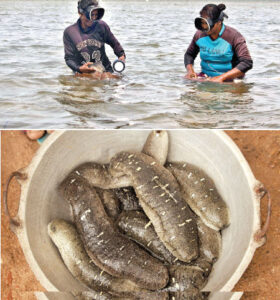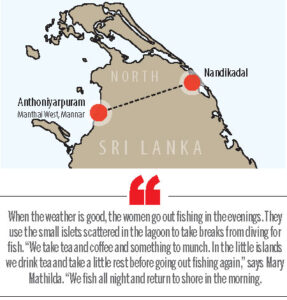Text and Pix: Indunil Usgoda Arachchi
Widowed or badly affected during the decades of conflict, the fisher community in Anthoniyarpuram, Mannar has new heroes. Groups of women have formed fisheries cooperative societies, and often spend the night at sea, diving for sea cucumbers and crustaceans in the waters of the Lagoon to keep their families alive and reconstruct lives torn apart by war
 As dawn breaks over the village of Anthoniyarpuram, Mannar, we could see a tiny footpath leading down to the lagoon. Unlike before, the little village is at peace now; morning sunbeams make dancing patterns on the sand, and palmyrah trees sway in the soft breeze. A decade ago, this was a region marked by violence and loss. Residents fled the war, returning years later to find their homes entirely altered. They were altered too – some of them had lost loved ones, others were missing limbs, while homes and livelihoods had been wiped out. Returning families had to start from scratch and in most cases, the women were left to do it.
As dawn breaks over the village of Anthoniyarpuram, Mannar, we could see a tiny footpath leading down to the lagoon. Unlike before, the little village is at peace now; morning sunbeams make dancing patterns on the sand, and palmyrah trees sway in the soft breeze. A decade ago, this was a region marked by violence and loss. Residents fled the war, returning years later to find their homes entirely altered. They were altered too – some of them had lost loved ones, others were missing limbs, while homes and livelihoods had been wiped out. Returning families had to start from scratch and in most cases, the women were left to do it.
The footpath wound down to the lagoon, and female silhouettes appeared in the distance. Many of them were holding implements of some kind. When the strangers approached, their faces broke out in smiles in the early morning light. The fisher community, now bereft of men – many who perished during the war – have leaned on women like Paththinathan Elizabeth, Jayanthi Muller and Mary Matilda to eke out a living in the way they know best. Now the sole breadwinners in their families, the three women go out to sea every day, diving in the lagoon to catch a bounty of shrimp, crabs and reef fish.
Paththinathan Elizabeth, 53, is the President of the Anthoniyarpuram Fisheries Cooperative Society. Many women have been widowed in the war, she explains, and others are still struggling to rebuild, a decade after the guns fell silent. “The women in these areas have formed small groups and we go out to sea together. This is how we make a living,” Elizabeth said. Non Governmental Organisations have supplied this resilient community of women with the necessary fishing and diving equipment.
Anthoniyarpuram residents have always lived off the bounty of the seas, said the Fisheries Cooperative Society leader. “But before the war, the women would only assist the men who went out to sea. It’s different now – we must do the bulk of the fishing,” she explains with a smile.
When the weather is good, the women go out fishing in the evenings. They use the small islets scattered in the lagoon to take breaks from diving for fish. “We take tea and coffee and something to munch. In the little islands we drink tea and rest a while before going out fishing again,” says Mary Matilda. “We fish all night and return to shore in the morning.”
Jayanthi Muller says, on and off the Navy stops the women from going out to sea, fearing for their safety. “It must be because we are women, and they worry there would be an accident. But, we are all good swimmers,” Muller laughs. She says, the women enjoy fishing because it allows them to spend time together and eke out a decent living.
 An elderly woman in a long dress approaches, her long hair still wet, hanging loosely around her shoulders. Nachchaththiram Lurdumuller is 75 years. She and a group of fisherwomen had come to shore at dawn, after fishing all night. She explains that several older women engage in dive-fishing in the waters of the lagoon. “I have only a daughter. She is married now. So this helps me to earn a living,” Lurdumuller explains.
An elderly woman in a long dress approaches, her long hair still wet, hanging loosely around her shoulders. Nachchaththiram Lurdumuller is 75 years. She and a group of fisherwomen had come to shore at dawn, after fishing all night. She explains that several older women engage in dive-fishing in the waters of the lagoon. “I have only a daughter. She is married now. So this helps me to earn a living,” Lurdumuller explains.
Behind the camaraderie and the broad smiles, each of these women is heir to a tragic war-afflicted past. “We were displaced during the war. My husband, daughter and I went from place to place to escape the fighting. In front of our very eyes, shells fell on people and they were torn apart. We would run to a bunker then. As the fighting flared on all sides, we were stuck in between,” Lurdumuller recalls. The 75-year-old woman was widowed when an artillery shell fell on her husband while he was on his way to the shop, killing him instantly. “We were alone then, my daughter and I. We followed the rest of the displaced from place to place.”
Lurudumuller says, finally they crossed the Nandikadal Lagoon, and into Government-held territory during the final stages of the war. “At 3 a.m. the military put us all in a bus and brought us to the Ramanathan Displacement camp. Ultimately, we returned to our village. It’s a miracle that we are alive today – God must have saved us,” she says, her eyes brimming with tears and memory.
ු
Elizabeth is the mother of six daughters and she recalls, as they were displaced from location to location, people warned her about the safety of her girls. “But, what could we do. One day we were in one place, the next day in another,” she says, explaining that they were beaten further and further into the Wanni by the vicious fighting.
At the end however, Elizabeth’s family had made the journey to Mullivaikkal by foot and the final stage of the war was upon them. “The LTTE said no one was to leave. They told us to stay inside the bunkers,” Elizabeth recalled. Her husband would put them all inside the bunker and sit outside keeping watch. It was during one such vigil that a stray shell fragment fell on him and his leg was wounded. People from other bunkers had come to his aid and taken him to the Mullivaikkal make-shift hospital for treatment. Disregarding the pleas of those around her, Elizabeth went secretly to visit her husband in the hospital. She finds it hard to tell the rest of the story.
“I never found him there, but outside there were hundreds of wounded people lined up close together, blood spilling everywhere,” she remembers. Once Elizabeth and her children found their way back to Government controlled area, they were reunited with her husband who was receiving treatment at the Vavuniya Hospital.
“This is only one of our stories,” she says wistfully. “We have so many more.” Elizabeth says, she considers herself lucky to be able to engage in a livelihood that keeps her family going, after all that they suffered.
Lurdumuller walks off, eager for some rest after her long night of fishing and having shared their stories, the other women walk slowly towards the water.
As they approach the still waters of the lagoon, the women put on scuba masks and wade in, going slowly until they find the right depth. Putting their faces in, the women begin diving for the prized catch in these lagoon waters – sea cucumbers, for which there is a big demand in the export market.
These fish are not purchased locally, but each day, fish traders arrive to purchase the precious ocean bounty, a delicacy in some East Asian nations.
Wading deeper and deeper, the women dive to the seabed to bring up the flat cylindrical sea creatures with the leathery skin.
Sustainability is a big priority, the ladies say, as they wade in to the lagoon. “Some of the men use nets and catch even the baby fish. We are totally opposed to this.
It would eventually wipe out our livelihood when the ocean resources dry up,” they explain, swimming deeper and deeper into the ocean and disappearing underwater.
Mannar’s Women of the Sea | Sunday Observer
http://www.sundayobserver.lk/

